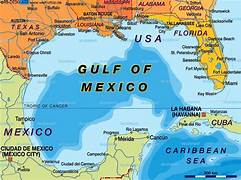Mexico vs. Google: Legal Battle Looms Over Gulf of Mexico Name Change on US Maps
📌 A Controversial Cartographic Shift
Mexico has threatened legal action against Google after reports emerged that the tech giant altered the name of the Gulf of Mexico on US-based maps. The alleged name change has sparked outrage among Mexican officials, who view the move as an attempt to undermine the historical and geographical significance of the gulf, which plays a crucial role in the country’s maritime identity.
While Google has yet to issue an official statement addressing the controversy, Mexico’s government has made it clear that it will not tolerate what it perceives as a misrepresentation of national and international geography. The dispute raises broader concerns over the power of private corporations to influence geopolitical narratives through digital mapping technologies.
📌 The Gulf of Mexico: A Maritime and Economic Lifeline
The Gulf of Mexico is an expansive body of water bordered by Mexico, the United States, and Cuba. It serves as an essential economic and environmental resource for all three nations, supporting industries such as fishing, tourism, and offshore oil drilling.
For Mexico, the gulf represents not only a strategic economic zone but also a symbol of national sovereignty. Any modification to its internationally recognized name—especially on platforms as widely used as Google Maps—could have significant implications for how the world perceives territorial claims and regional ownership.
📌 Mexico’s Legal Stand: A Fight for Sovereignty
Mexico’s Foreign Ministry and legal experts are now exploring potential legal avenues to challenge Google’s alleged modification. Authorities argue that altering geographical names without consultation or international consensus sets a dangerous precedent, allowing corporations to dictate territorial terminology outside of established diplomatic channels.
While no official lawsuit has been filed yet, Mexican officials are considering legal action under international law, possibly invoking agreements related to geographical naming conventions and digital mapping regulations. The case could also fall under UNESCO and the United Nations Group of Experts on Geographical Names (UNGEGN), which oversee international place-name standardization.
📌 Tech Giants and Territorial Disputes: A Growing Concern
This is not the first time a major tech company has been accused of geopolitical bias in digital mapping. Over the years, companies like Google, Apple, and Microsoft have faced criticism for renaming disputed territories, adjusting borders based on different national perspectives, or displaying alternative versions of maps depending on the user’s location.
For instance, Google Maps shows Crimea as part of Russia for users within Russia but maintains its internationally recognized status as part of Ukraine elsewhere. Similarly, China’s territorial claims in the South China Sea have been reflected differently on various digital maps depending on regional policies.
📌 Diplomatic and Public Reactions
The Mexican public has responded strongly to the controversy, with social media users expressing frustration over what they see as an attempt to diminish their country’s maritime identity. Nationalist sentiment is running high, with many urging the government to take a firm stand against Google and demand immediate corrections.
Diplomatic experts warn that such incidents, if left unaddressed, could lead to larger disputes. Mexico is now seeking official clarification from both Google and US authorities regarding the name change, as any unilateral modification by an American-based company could also be interpreted as a political move.
📌 What Comes Next?
The Mexican government is expected to formally request an explanation from Google, urging the company to revert to the historically recognized name. If the tech giant does not comply, Mexico may escalate the matter through legal action or diplomatic channels at international forums.
Meanwhile, this incident underscores the influence of digital platforms in shaping public perception of geography and sovereignty. As governments increasingly rely on technology for official mapping and navigation, the debate over who controls digital cartography is becoming more critical than ever.
For now, the world watches as Mexico prepares for a potential legal showdown with one of the largest tech companies in the world, setting a precedent for how nations defend their geographical heritage in the digital age.

